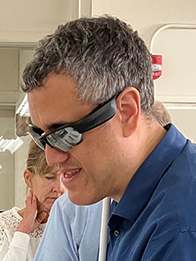Empowering the Future: Celebrating National STEM Day with Insights and Inspiration
November 8, 2023
Each year on November 8th, we celebrate the incredible contributions of Science, Technology, Engineering and Mathematics (STEM) to our world. More than just a collection of academic subjects, STEM continues to be a driving force behind many discoveries and innovations that we use every day. We recently spoke to a few ETS’ers to get their perspectives on STEM and how we can ensure continued progress in these fields now and in the future.
 How can we encourage more young people, especially girls and underrepresented minorities, to pursue STEM careers?
How can we encourage more young people, especially girls and underrepresented minorities, to pursue STEM careers?
Swapna Somasundaran (Director of NLP Research): The separation by stereotypes starts early on, as I saw in the case of my daughter in kindergarten. She saw more boys at the class computer and more girls doing crafts. Thus, she chose to go for craft activities rather than the computer games. Inclusivity from a very young age is important as this divergence in pathways will only exacerbate if left unchecked. Teachers and caregivers need to be aware of this and make sure that girls feel welcome and included in STEM activities.
Representation is also important. Reading biographies of women scientists, watching talks from women technologists, being mentored by successful women leaders can encourage girls who feel overwhelmed as a minority in STEM careers. There are a number of organizations such as Girls Who Code (https://girlswhocode.com) and AnitaB.org (https://anitab.org) that organize events for women in technology that help girls and women grow their network.
 How do you think STEM fields can help address societal challenges, such as inequality, poverty and access to education?
How do you think STEM fields can help address societal challenges, such as inequality, poverty and access to education?
Cary Supalo (Research Developer): The fundamental skill of problem-solving is at the core of what STEM professionals use in their work every day. To that end, having a science literate society is very important for promoting equality for all citizens. The ability to critically analyze questions or concerns that face society will be beneficial for the promotion of the quality of life for everyone in a community. STEM employment opportunities tend to compensate very well and thus this will reduce poverty in a community. STEM professionals do have the opportunity to participate in a STEM-literate society both economically and in society by sharing their know-how and expertise for the betterment of the community as a whole. There is a shortage of STEM educators today and thus if a person is interested in pursuing a career in the classroom, becoming a content knowledge expert in various STEM fields will be doing your community a big service for training the future generations of informed citizenry.
How do you think technology and engineering can address pressing global challenges like climate change, healthcare or energy sustainability?
Cary Supalo: Energy sustainability is a complex issue to address. However, optimization of renewable energy is the holy grail of applications for humanity in the twenty-first century. solar energy along with wind power tend to be some of the most renewable energy sources known today. However, as we all know there are many others that are not renewable. Petroleum is very popular because of its low cost and high level of ubiquity. Nuclear energy is very energy efficient, but it can have negative side effects that have been politicized more or less in a negative context. That being said, we are all familiar with electric cars. It is important for us to note the source of the electric power that is used to power EVs. If the electricity is produced from coal power plants, then this energy source is still not sustainable. Therefore, it is important for us to understand the supply chain of energy, where it comes from, and how it is produced. This is how we can truly determine if the energy is being sourced in a sustainable way.
 Jim Colquist (Principal Architect, IT): The current challenges we face around climate change can be discouraging. Most of us are not able to control policy at a global or government level, so it may feel sometimes that there is little we can do to affect change. However, as a STEM leader, you can control the things YOU build. Even if you are not directly working in a field related to climate change, you can include sustainability and climate concerns as a pillar of anything you build in any field.
Jim Colquist (Principal Architect, IT): The current challenges we face around climate change can be discouraging. Most of us are not able to control policy at a global or government level, so it may feel sometimes that there is little we can do to affect change. However, as a STEM leader, you can control the things YOU build. Even if you are not directly working in a field related to climate change, you can include sustainability and climate concerns as a pillar of anything you build in any field.
Examples include:
- Can you use renewable energy sources, like solar or wind?
- Can you choose environmentally friendly and sustainable materials for your project? Can you build with more energy-efficient materials and techniques?
- Can you reduce emissions by using filters or cleaner fuels?
- Can you reduce waste by optimizing your manufacturing processes, or reducing packaging?
- Can you reduce energy consumption? In IT, this can mean using virtualized servers, consolidating hardware, or just turning off computing services when they aren’t needed.
These are only a few examples, but the point is that even small changes have a positive impact!
 What advice would you give to someone considering a career in a STEM field?
What advice would you give to someone considering a career in a STEM field?
Burcu Arslan (Research Scientist):
- Always be curious and embrace the unknown. STEM is about discovery and always learning something new. So, be open, ask questions, and enjoy the journey of endless exploration.
- Having a multidisciplinary background is highly important to advance scientific knowledge and make innovation. So, leave behind your comfort zone and learn new knowledge, skills, and methodologies from different fields. Follow scientists and scientific accounts on social media. Read science magazines, popular science books, and blogs in different fields to stay up to date with the latest developments in STEM fields. They can offer different perspectives and fresh insights.
- Last but not least, don't be shy. Reach out to experts online. Having the right connections is important to advance your career in a STEM field as important as in non-STEM fields.
Jim Colquist: My advice might not be what you'd expect. I would say that to truly be effective and advance in the STEM world - do not ignore your non-STEM skills! Nothing meaningful happens in the STEM world without communication and collaboration. Those who have the most success in the STEM field have the ability to:
- Write effectively. In the world of distributed workforces, there will be many people who may never see you in person … their only impression of you is what you write in emails or group chats.
- Verbally communicate and be able to present to groups. Don't be afraid of presentations! The more you do them, the less daunting they become.
- Bridge the gap between technical and non-technical people. The ability to be able to explain technical requirements and challenges to your customer (and the reverse!) are invaluable skills.
- Lead a team. Even starting small and leading a few people on a single task helps hones your “soft skills” and lets you learn how to manage conflict, foster teamwork, and inspire creativity.
Are there any misconceptions about STEM fields that you'd like to dispel?
Burcu Arslan: One of the most prevalent misconceptions I've encountered, especially having lived in multiple countries, is the idea that STEM fields are exclusively for the "smart" people. But the truth is that passion, dedication, hard work, and perseverance are often more crucial. Just like playing an instrument, or mastering a sport, diving into science, technology, engineering, or mathematics requires consistent effort, practice, and a willingness to learn from mistakes.
Some of the most groundbreaking minds in STEM didn't start as child prodigies. They faced challenges, made errors, and experienced countless setbacks. But it was their perseverance, curiosity, and drive that set them apart.
So, if you or someone you know is passionate about exploring the mysteries of the universe, building the next tech innovation, or solving complex problems, remember it's about dedication, resilience, and a lifelong love of learning. Everyone, regardless of their starting point and background, has the potential to contribute to and thrive in STEM fields.
 Are there any STEM-related hobbies or projects you enjoy working on in your free time?
Are there any STEM-related hobbies or projects you enjoy working on in your free time?
Jessica Andrews Todd (Managing Senior Research Scientist): In my free time, I enjoy indoor and outdoor gardening. This is a hobby I have had for the last several years. I have about 50 indoor plants and maintain a fruit and vegetable garden in my backyard. This year I had strawberries, green beans, bell peppers, tomatoes, and butternut squash in my outdoor garden. Though it might not seem like it, gardening presents many opportunities to apply STEM knowledge, particularly science and mathematics knowledge. For example, making sure the soil’s acidity level (pH) is appropriate for the type of plant used incorporates chemistry concepts, and determining the lighting needs for different kinds of plants invokes concepts related to photosynthesis as plants turn the light source into energy needed to grow and bloom. Further, measuring the appropriate amount of fertilizer necessary to meet the growth needs of different kinds of plants and determining the number of seeds needed and their spacing requirements to maximize plant growth applies mathematics concepts.